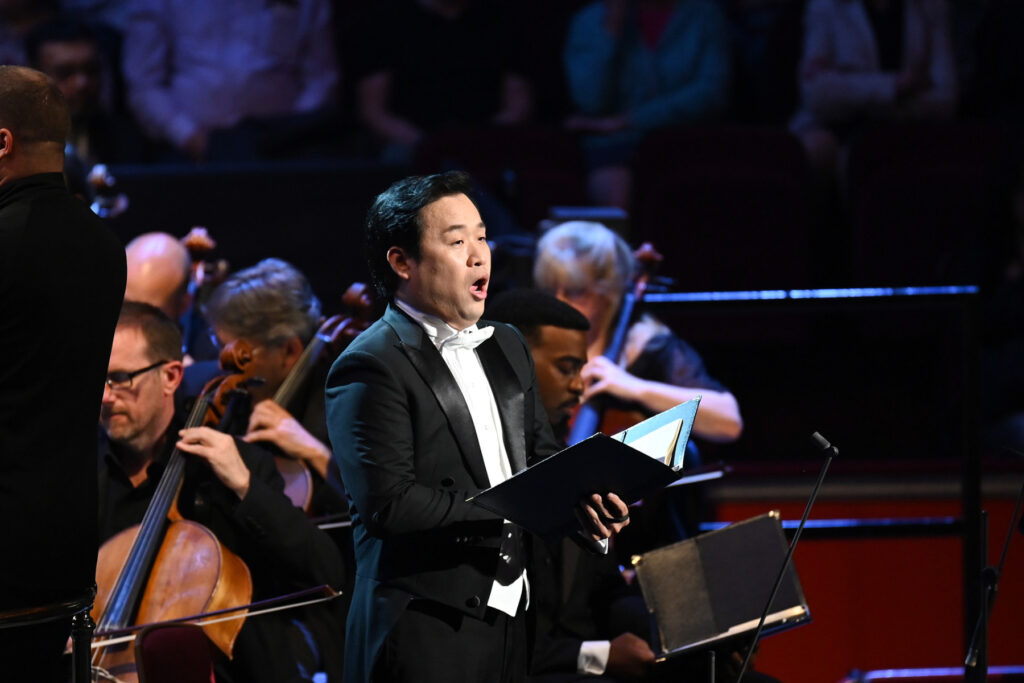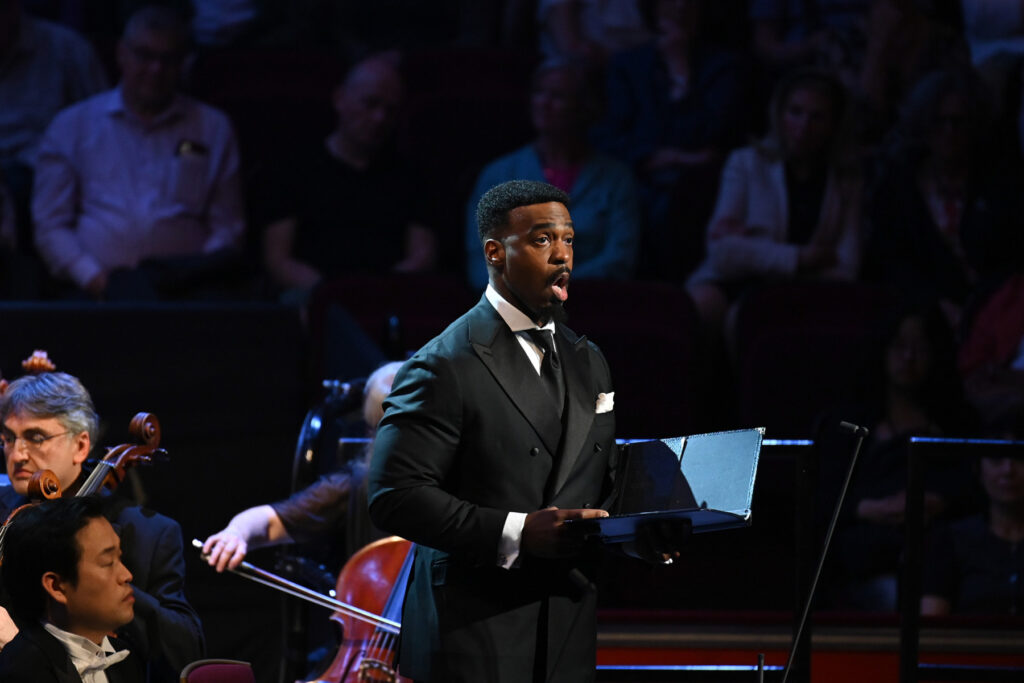With this performance, the first given at the Proms since 2021, and twenty-second since its first outing in 1956, Verdi’s Requiem is now the most frequently performed non-operatic work I have reviewed for Opera Today. Those earlier ones seem to have been something of a mixed bag, perhaps not surprising in a piece that neither knows if it is operatic or ecclesiastical – or can wield a quartet of soloists that have any sense of balance. Moreover, do we end up with something that is cerebral and earthbound or risk-taking and passionate?
This performance – played by BBC National Orchestra of Wales and conducted by Ryan Bancroft – was far from perfect but I will take that any day over the opposite when so much of what we got here was done with such blazing force and compelling drama. The looseness of ensemble, or messy entries, you sometimes got in performances by Furtwängler or Klemperer never bothered me when the inspiration was so high; the clinical severity of a Szell always has. Bancroft might well have found something of a middle ground: he trod a fine line between allowing his orchestra some freedom in how they weighted their sound when other conductors might have chosen to control it more. Some of the brass playing (especially the trumpets) wasn’t just powerful, it was actually raw, often cutting to the bone. If you wanted terror in this work you got it and it was driven inexorably. I’m not sure any ‘Sanctus’ I have heard has quite had the impact this one did. There was no reigning in of the ‘Dies irae’ either. From the outset this was a fascinating contrast of furious power, apocalypse and horror but with heights of passion and towering intensity sweeping through it that was a colossal picture of dramatic colour it’s quite rare to hear in performances of this Requiem. Where many performances I have heard have run out of steam by the time we get to the ‘Libera me’ here it was just electrifying, helped in part by a soprano – Latonia Moore – who strayed so close to the edge of vocal sinew she sent shivers down the spine. In part it may have been the tricky acoustic, but rather than have the soprano triumphantly soar completely over the orchestra and chorus here she rather melted into them – an effect rather closer to the end of Mahler’s ‘Resurrection’ Symphony. Bancroft lavished care and detail almost everywhere (especially with the choruses) and tempi were measured at times – although swift where it mattered. Importantly, this performance never hung fire – even if it was often one that seemed to catch fire.

The spine of this work is its soloists and as much as conductors have tried to find a quartet that are perfect it’s rarely worked out that way. There were three Prom debuts here (the mezzo, Karen Cargill, being the exception) and in many ways they were exceptional ones. The tenor (the Korean, SeokJong Baek) and the bass (the American, Solomon Howard) were standouts – a dual between a Puccinian Calaf and a Wagnerian Hunding. Korean tenors (especially those who have taken on Calaf, such as the slightly heftier Yonghoon Lee who sang the role at Covent Garden in 2023) have a particular gift not just for subtlety and tonal warmth but also for managing the falsetto demands of the tenor part in Verdi’s Requiem. SeokJong Baek’s voice isn’t a mighty one, at least when melded with the chorus, but it’s an instrument of astonishing beauty and he absolutely knows what to do with the music. Of any solo the ‘Ingemisco’ was the single most impressively sung one; the range of tone was majestic, the shards of colour pointed with breathtaking refinement. There was no pressure in the upper register (and how gorgeous he also was in the a capella section of the trio of the ‘Quid sum miser’ with the mezzo and soprano singing of penitence and salvation).
Solomon Howard’s bass is also an instrument of great beauty, and magnificent darkness. This was my first time hearing this bass and his first note was really striking in its resonance, something which would be a lasting feature of his singing. The drama in his voice was superb – I struggled to remember a more terrifying “mors” in the ‘Tuba mirum’ (never dense, as some can be) and yet the voice was thrilling at E flat (“Judicanti responsura”) and even more shattering in the ‘Rex tremendae’.

Karen Cargill’s mezzo-soprano is like a great Sphinx – a towering edifice, timeless in its ability to never shift like the landscape of desert sands. This is a voice that is cast in iron, but that still manages to have a burnished tone to it that so often finds its beauty from the instruments behind her. It has the mahogany of cellos, and the golden richness of the horns – but she is also able to sing with the poetic reediness of the oboe or bassoon. Cargill is often so spellbinding she tends to draw attention towards her (rather as Jessye Norman did in the few performances when she also sang the mezzo part) but this tended to be less obvious here because of the strength of the soloists elsewhere. Nevertheless, the ‘Recordare’ was magnificent, and she rather shone in the ‘Liber scriptus’, too.
Which brings me to Latonia Moore’s soprano. A noted Turandot, Tosca and Desdemona the scale of the voice was never in doubt, and some of her singing was just staggering in both its volume and power. But this was also a performance that was like a rough-cut diamond, and quite raw at times – it felt oddly out of sorts with what we were hearing from both the tenor and bass, a conflict between something that looked deep within the meaning and spirituality of this work and something which took quite an opposing position to that. I think this conflict tended to jar at first and perhaps only as the performance became more gripping did it really begin to work with Moore’s imposing voice suggesting that the work is laden with strife. What perhaps worked better here than it normally does was the ‘Agnes dei’. With a soprano and a mezzo who are often so far apart vocally Moore and Cargill found a unison in their power that made them more prone to converge. Less certain, was Moore’s a capella at the beginning of the ‘Libera me’ which did sound as if it was waning a little – although that did nothing to prevent her pulling off the rest of it with which was electrifying – including a pianissimo top B flat that was nailed beautifully.
The combined choruses of BBC National Chorus of Wales and Crouch End Festival Chorus were magnificent. Thrilling in the ‘Sanctus’, the opening of the choral ‘Introit’ had displayed what beautiful balances of sound and projection we got from both of them.
Certainly one of the best performances of this great work I have heard in quite some years.
This concert will be shown on BBC Four on Friday 26 July at 8pm. You can listen on BBC Sounds and watch on BBC iPlayer for 12 months.
Marc Bridle
Giuseppe Verdi
Requiem
Cast and production staff:
Latonia Moore – soprano; Karen Cargill – mezzo-soprano; SeokJong Baek – tenor; Soloman Howard – bass; BBC National Chorus of Wales (Adrian Partington, chorus-master); Crouch End Festival Chorus (David Temple, chorus-master); BBC National Orchestra of Wales; Ryan Bancroft – conductor
Royal Albert Hall, London, 23 July 2024.
Top image (left to right): Latonia Moore (sop); Karen Cargill (mezzo); SeokJong Baek (tenor); Soloman Howard (bass) – Ryan Bancroft (conductor).
All photos by Chris Christodolou.